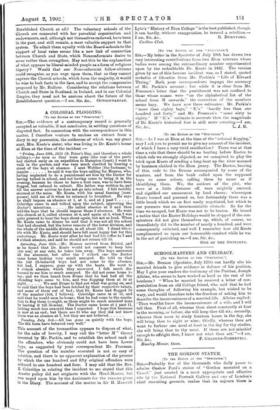A COLOSSAL FLOGGING.
[To THE EDITOIS OP THE "SPECTATOR:"] Sut,—The evidence of a contemporary record is generally accepted as valuable, if not conclusive, in settling questions of disputed fact. In connection with the correspondence in this matter, I therefore venture to enclose an extract from a diary in my possession, the authoress of which was my great aunt, Mrs. Keate's sister, who was living in Dr. Keate's house at Eton at the time of the incident :— "Fricloy, June 29th, 1832 (S. Peter's Day, and therefore a whole holiday).—As soon as they were gone (the rest of the party had started early on an expedition to Hampton Court) I went to walk in the garden, and was very much startled by hearing a shout of the boys at absence. I sent Webber [the footman] to inquire he said it was the boys (tailing for Monroe, who, having neglected to do a punishment set him by the Doctor for having talked in school, and not having come to bring it in the evening, because he chose to have a boat race, was to have been flogged, but refused to submit. His father was written to, and till the answer arrives he does not go into school. I felt terribly alarmed at the noise. Mr. Keate, with his usual feasting [com- posure] told me of it when he returned to breakfast. He says
he shall impose an absence at 1, at 5, and at + past 7 Coleridge came in and talked upon the subject, approving the
Doctor's intentions He called absence at 2 and then told the boys that he should impose those 3 absences. He went into church at 3, called absence at 4, and again at 5, when I was quite grieved to hear the boys shout again, but not so loud. When Mr. Keate came to dinner he said that it was not all the school that had shouted, but the lower remove of the lower division, and the whole of the middle division, in all about 150. I dined tete-a- tete with Mr. Keate, and should have felt most happy but for this contretemps. Mr. Keats went after he had had his coffee to 7 and 8 o'clock absence, and said he should not return till 10.
Saturday, June 30th.—Mr. Monroe arrived from Bristol, and as he found that Dr. Keats would not consent to keep him [his son] at any rate, he takes him away. The boys answered all the absences, but after the 7 o'clock one the Doctor came home looking very much annoyed. He told us that the 150 ill-behaved boys had not come to the absence,
but had, I suppose, gone up with the boats. He went to
8 o'clock absence, which they answered. I felt much dis- tressed to see him so much annoyed. He did not come home to tea; and we then heard from Evans that he had had all the offending boys come to him, and was flogging them at 10 at night. . . . . . We sent Evans to find out what was going on, and he said that the boys had been fetched by their respective tutors, and some of them out of bed ; that Dr. Keats had flogged 70 of the number (104, I believe). Coleridge came in at 11, and said that he would soon be home; that he had come to the resolu- tion to flog them to-night, as there might be much mischief done by leaving it till Monday. The Doctor came home at it past 11, looking much less annoyed than I expected. I hope this business is now at an end; but there are 21 who say they did not know there was an absence at 7, but they are not believed. Tuesday, July ard.—All has gone on quietly with the boys. The 6th form have behaved very well."
This account of the transaction appears to dispose of what, for the sake of brevity, I may call the "letter M" theory invented by Mr. Parkin, and to establish the school rank of the offenders, who obviously could not have been Lower boys, as suggested by your correspondent Mr. Freeman. The question of the number executed is not so easy of solution, and there is no apparent explanation of the process by which the one hundred and fifty original offenders were reduced to one hundred and four. I may add that the Rev. E. Coleridge in relating the incident to me stated that this drastic policy did not originate with the Head-Master, but was urged upon him by the Assistants for the reasons given in the Diary. The account of the matter in Sir H. Maxwell Lyte's "History of Eton College "is the best published, though it can hardly, without exaggeration, be termed a rebellion.—
Carlton Club.






































 Previous page
Previous page